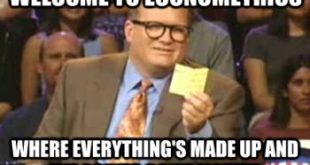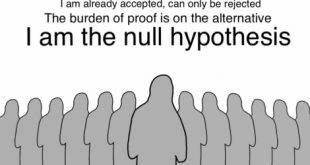Keynes on the ‘devastating inconsistencies’ of econometrics In practice Prof. Tinbergen seems to be entirely indifferent whether or not his basic factors are independent of one another … But my mind goes back to the days when Mr. Yule sprang a mine under the contraptions of optimistic statisticians by his discovery of spurious correlation. In plain terms, it is evident that if what is really the same factor is appearing in several places under various...
Read More »Three suggestions to ‘save’ econometrics
Reading an applied econometrics paper could leave you with the impression that the economist (or any social science researcher) first formulated a theory, then built an empirical test based on the theory, then tested the theory. But in my experience what generally happens is more like the opposite: with some loose ideas in mind, the econometrician runs a lot of different regressions until they get something that looks plausible, then tries to fit it into a theory (existing or...
Read More »The elite illusion
The results reported here suggest that an exam school education produces only scattered gains for applicants, even among students with baseline scores close to or above the mean in the target school. Because the exam school experience is associated with sharp increases in peer achievement, these results weigh against the importance of peer effects in the education production function … Of course, test scores and peer effects are only part of the exam school story. It may be...
Read More »Slim by chocolate — a severe case of goofed p-hacking
Slim by chocolate — a severe case of goofed p-hacking Frank randomly assigned the subjects to one of three diet groups. One group followed a low-carbohydrate diet. Another followed the same low-carb diet plus a daily 1.5 oz. bar of dark chocolate. And the rest, a control group, were instructed to make no changes to their current diet. They weighed themselves each morning for 21 days, and the study finished with a final round of questionnaires and blood...
Read More »Econometrics — science built on beliefs and untestable assumptions
Econometrics — science built on beliefs and untestable assumptions What is distinctive about structural models, in contrast to forecasting models, is that they are supposed to be – when successfully supported by observation – informative about the impact of interventions in the economy. As such, they carry causal content about the structure of the economy. Therefore, structural models do not model mere functional relations supported by correlations, their...
Read More »Top 10 critiques of econometrics
Top 10 critiques of econometrics •Achen, Christopher (1982). Interpreting and using regression. SAGE •Berk, Richard (2004). Regression Analysis: A Constructive Critique. SAGE •Freedman, David (1991). ‘Statistical Models and Shoe Leather’. Sociological Methodology •Kennedy, Peter (2002). ‘Sinning in the Basement: What are the Rules? The Ten Commandments of Applied Econometrics’. Journal of Economic Surveys •Keynes, John Maynard (1939). ‘Professor...
Read More »Econometric inferences — idiosyncratic, unstable and inconsistent
Econometric inferences — idiosyncratic, unstable and inconsistent The impossibility of proper specification is true generally in regression analyses across the social sciences, whether we are looking at the factors affecting occupational status, voting behavior, etc. The problem is that as implied by the three conditions for regression analyses to yield accurate, unbiased estimates, you need to investigate a phenomenon that has underlying mathematical...
Read More »NHST — a case of statistical pseudoscience
NHST — a case of statistical pseudoscience NHST is an incompatible amalgamation of the theories of Fisher and of Neyman and Pearson (Gigerenzer, 2004). Curiously, it is an amalgamation that is technically reassuring despite it being, philosophically, pseudoscience. More interestingly, the numerous critiques raised against it for the past 80 years have not only failed to debunk NHST from the researcher’s statistical toolbox, they have also failed to be...
Read More »Making It Count
Modern econometrics is fundamentally based on assuming — usually without any explicit justification — that we can gain causal knowledge by considering independent variables that may have an impact on the variation of a dependent variable. This is however, far from self-evident. Often the fundamental causes are constant forces that are not amenable to the kind of analysis econometrics supplies us with. As Stanley Lieberson has it in his modern classic Making It Count: One can...
Read More »Regression analysis and randomisation distract us from the real scientific issues
Regression analysis and randomisation distract us from the real scientific issues In my view, regression models are not a particularly good way of doing empirical work in the social sciences today, because the technique depends on knowledge that we do not have. Investigators who use the technique are not paying adequate attention to the connection – if any – between the models and the phenomena they are studying. Their conclusions may be valid for the...
Read More » Heterodox
Heterodox










